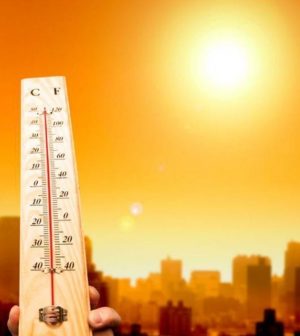- The Best Time of Day to Drink Bone Broth to Maximize Health Benefits
- 8 Ways to Increase Dopamine Naturally
- 7 Best Breads for Maintaining Stable Blood Sugar
- Gelatin vs. Collagen: Which is Best for Skin, Nails, and Joints?
- The Long-Term Effects of Daily Turmeric Supplements on Liver Health
- Could Your Grocery Store Meat Be Causing Recurring UTIs?
- Are You Making This Expensive Thermostat Error This Winter?
- Recognizing the Signs of Hypothyroidism
- 10 Strategies to Overcome Insomnia
- Could Artificial Sweeteners Be Aging the Brain Faster?
Weak Action on Climate Change Is Stressing Young People Worldwide

While climate change calls to mind extreme weather and melting polar ice caps, government officials’ inaction to stop it is also affecting the mental health of young people, new research reveals.
“This study paints a horrific picture of widespread climate anxiety in our children and young people. It suggests for the first time that high levels of psychological distress in youth is linked to government inaction,” study author Caroline Hickman, of the Climate Psychology Alliance at the University of Bath in England, said in a university news release.
The researchers surveyed 10,000 young people between 16 and 25 years of age in 10 countries. Forty-five percent said climate anxiety and distress affects their daily lives, and 75% called the future frightening.
In addition, 58% said governments were “betraying me and/or future generations,” and 64% said their governments weren’t doing enough to avoid a climate catastrophe.
Mitzi Tan, a 23-year-old from the Philippines, said she grew up being afraid of drowning in her own bedroom.
“Society tells me that this anxiety is an irrational fear that needs to be overcome — one that meditation and healthy coping mechanisms will ‘fix,'” Tan said. “At its root, our climate anxiety comes from this deep-set feeling of betrayal because of government inaction. To truly address our growing climate anxiety, we need justice.”
The anxiety is a “completely rational reaction,” Hickman said.
“Children and young people are now mobilizing around the world and taking governments to court; arguing that failure to act on climate change violates their human rights,” she said. “This study makes an important contribution to these legal arguments, framing climate anxiety and distress as a ‘moral injury.'”
The study included the United States, United Kingdom, Australia, India, Nigeria, Philippines, Finland, Portugal, Brazil and France.
Young people surveyed from the Global South — encompassing Africa, Latin America and the Caribbean, Pacific Islands and developing nations in Asia — expressed more worry and a greater impact on functioning.
More than half of survey respondents said they had felt afraid, sad, anxious, angry, powerless, helpless and/or guilty.
About 55% said they expected to have fewer opportunities than their parents had. About 65% said governments were failing young people. About 59% said they were very or extremely worried about climate change.
The study concluded that governments must respond to “protect the mental health of children and young people by engaging in ethical, collective, policy-based action against climate change.”
The findings were recently published in The Lancet Planetary Health.
More information
NASA has more on climate change.
SOURCE: University of Bath, news release, Dec. 22, 2021
Source: HealthDay
Copyright © 2026 HealthDay. All rights reserved.










